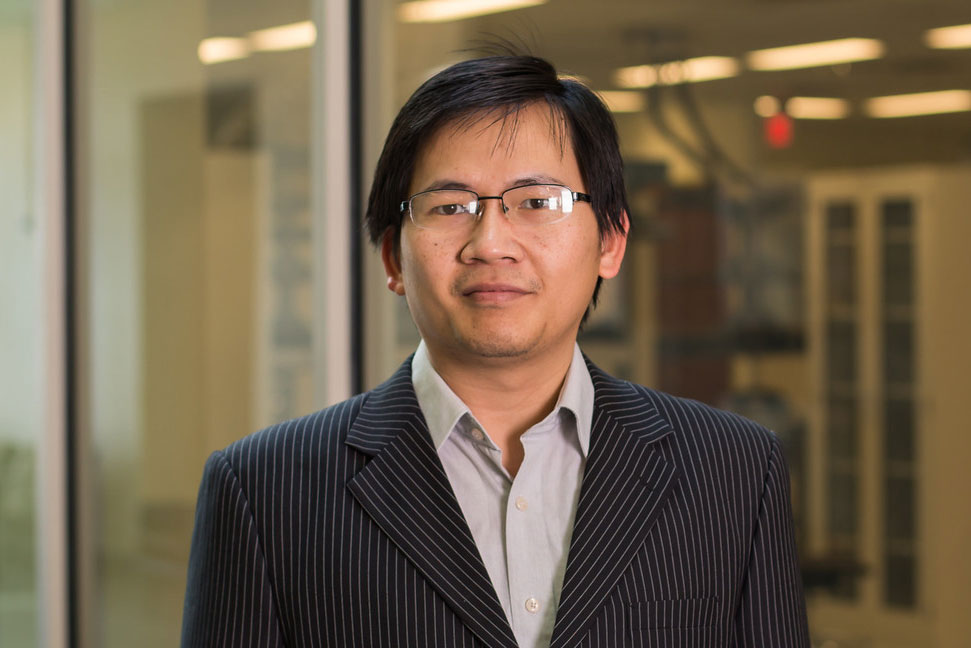VCU Cybersecurity Center Focus Area: Blockchain
BLOCKCHAIN TECHNOLOGIES: FROM AN ART TO A SCIENCE
Bitcoin and blockchain technologies significantly reshape the future of financial transactions, and distributed interactions in general, and eventually bring us a much more organized and documented digital world. The design of Bitcoin system is very elegant; it utilizes lightweight cryptographic tools in a smart way so that the resulting system is open, secure, and also efficient. Today, Bitcoin and blockchain technologies have gained lots of attention, and huge amount of creative ideas have been introduced by researchers, developers, and advocates in Bitcoin community.
We take the provable security approach to developing blockchain technologies. We hope we can eventually move these powerful blockchain technologies from an art to a science. Specifically, we are interested in the following research topics, developing novel, security analysis frameworks, consensus protocols, scalability solutions, applications on top of blockchains, governance strategies, anonymity and regulation.

Thang N. Dinh is an assistant professor in Virginia Commonwealth University. He received his Ph.D. in Computer Engineering at University of Florida in 2013. His research interest include Blockchain Optimization, billion-scale network analytics, and Mass-marketing Science. He has published more than 60 papers, with 3 best paper awards and nominations, in top venues including SIGMETRICS, MOBICOM, MOBISYS, SIGMOD, and ICDM. He was a co-founder and CTO of EthosU, a start-up on a next-generation social network for youths, and a co-founder of Fractal, a secure, scalable, and sustainable blockchain platform for decentralized economy.
Email: tndinh@vcu.edu
Phone: (804) 827-4007
Personal website: http://www.people.vcu.edu/~tndinh/

Hong-Sheng Zhou is an Assistant Professor in the Computer Science Department at Virginia Commonwealth University. He was a postdoc at Maryland Cybersecurity Center, as a recipient of NSF Computing Innovation Fellowship, under the direction of Jonathan Katz. Before that, he received his PhD at the University of Connecticut with Aggelos Kiayias as advisor. Currently, Hong-Sheng is also a scientist and co-founder of Fractal Platform, a new blockchain startup.
Hong-Sheng is working on multiple directions in cryptography including Secure Computing (e.g., Secure Multi-Party Computation, Cryptocurrency and Blockchain Technologies, Functional Encryption and Obfuscation, Verifiable Computation), and Extreme Cryptography (e.g., Leakage and Tampering Resilience, Klepto Resilience, Coercion Resilience, Quantum Resilience). He has published papers in the world's leading cryptography/security conferences, such as CRYPTO, EUROCRYPT, CCS, TCC, ITCS, PODC, ASIACRYPT, CSF, and Financial Crypto. More information about his research can be found at his page http://www.people.vcu.edu/~hszhou/.
Funded projects
Proof-of-Work and Proof-of-Stake Hybrid Consensus
In this project, we propose the first provably secure 2-hop blockchain by combining proof-of-work and proof-of- stake mechanisms. On top of Bitcoin’s brilliant ideas of utilizing the power of the honest miners, via their computing resources, to secure the blockchain, we further leverage the power of the honest users/stakeholders, via their coins/stake, to achieve this goal. The security of our blockchain holds if the honest players control majority of the collective resources (which consists of both computing power and stake). That said, even if the adversary controls more than 50% computing power, the honest players still have the chance to defend the blockchain via honest stake.
Supported by: IOHK Research
Faculty: Hong-Sheng Zhou
Smart Voting
The existing (election) voting systems, e.g., representative democracy, have many limitations and often fail to serve the best interest of the people in a collective decision-making process. To address this issue, the concept of liquid democracy has been emerging as an alternative decision- making model to make better use of “the wisdom of crowds”. However, there is no known cryptographically secure e-voting implementation that supports liquid democracy.
In this project, we propose a new voting concept called smart voting, which can be viewed as a natural extension of the conventional voting approaches. In the smart voting, instead of defining a concrete election candidate, each voter can define a statement in his/her ballot but leave the vote “undefined” during the voting phase. During the tally phase, the (conditional) actions expressed in the statement will be carried out to determine the final vote.
Smart voting can be found very useful in governance in blockchain and in many real world application scenarios.
Supported by: Egro Platform
Faculty: Hong-Sheng Zhou
Optimal Block Distribution
One of major limiting factor in current blockchain is the networks. The current P2P network communication model for broadcasting transactions and blocks does not scale as the number of miners and the volume of the transactions increase. This project aims to design optimal transactions and block distribution to greatly reduced network using advanced P2P and network optimization algorithms. The new distribution scheme will greatly reduced the interval between two consecutive blocks, thus, much faster confirmation time and higher throughput.
Supported by: Harmony.one
Faculty: Thang N. Dinh
Selected publications
Journals
T. N. Dinh and M. T. Thai, AI & Blockchain: A Disruptive Integration, IEEE Computer Magazine, Issue on Future of AI, 2018
Conferences
Correcting Subverted Random Oracles
Alexander Russell, Qiang Tang, Moti Yung, Hong-Sheng Zhou
CRYPTO 2018 -- Advances in Cryptology
Note: We provide techniques to secure blockchains even when the underlying hash functions are subverted.
Multi-Mode Cryptocurrency Systems
Tuyet Duong, Hong-Sheng Zhou, Alexander Chepurnoy
BCC 2018 -- The Second ACM Workshop on Blockchain, Cryptocurrencies and Contracts
TwinsCoin: A Cryptocurrency via Proof-of-Work and Proof-of-Stake
Alexander Chepurnoy, Tuyet Duong, Lei Fan, Hong-Sheng Zhou
BCC 2018 -- The Second ACM Workshop on Blockchain, Cryptocurrencies and Contracts
A Generic Paradigm for Blockchain Design
Phuc Thai, Laurent Nijik, Tuyet Duong, Lei Fan, Hong-Sheng Zhou
DLoT 2018 -- The First Workshop on Distributed Ledger of Things
Brief announcement: Statement Voting and Liquid Democracy
Bingsheng Zhang, Hong-Sheng Zhou
PODC 2017 -- ACM Symposium on Principles of Distributed Computing
Fair and Robust Multi-Party Computation using a Global Transaction Ledger
Aggelos Kiayias, Hong-Sheng Zhou, Vassilis Zikas
EUROCRYPT 2016 -- Advances in Cryptology
Designing Proof of Human-work Puzzles for Cryptocurrency and Beyond
Jeremiah Blocki, Hong-Sheng Zhou
TCC 2016B -- Theory of Cryptography Conference
Adaptively Secure Broadcast, Revisited
Juan Garay, Jonathan Katz, Ranjit Kumaresan, Hong-Sheng Zhou
PODC 2011 -- ACM Symposium on Principles of Distributed Computing
Manuscripts and submissions
A Large-Scale Scalable Proof-of-Stake Blockchain in the Open Setting
(or, How to Mimic Nakamoto's Design via Proof-of-Stake)
Lei Fan, Jonathan Katz, Hong-Sheng Zhou
2-hop Blockchain: Combining Proof-of-Work and Proof-of-Stake Securely
Tuyet Duong, Lei Fan, Jonathan Katz, Phuc Thai, Hong-Sheng Zhou
Proof-of-Space Blockchain Made Simple (via Proof of Stake)
Phuc Thai, Hong-Sheng Zhou
(‘*’ denotes student co-author)